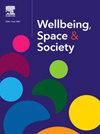Expanding enabling places theory through land-based cultural learning with indigenous men
IF 2.2
Q2 GEOGRAPHY
引用次数: 0
Abstract
Urban Indigenous men often lack opportunities to connect with the land and their culture. In this article, we report on a community-based participatory research project with urban Indigenous men in a land-based traditional drum-making program in Manitoba, Canada. Using a two-eyed seeing approach that brings together Indigenous ways of knowing and the concept of enabling places from health geography, we examine how land-based programming contributed to the men’s experiences of well-being. Data were collected through Sharing Circles and individual interviews. Two researchers and a research assistant completed inductive narrative analysis of verbatim transcripts using NVIVO software. We found that access to Land was central to men’s relationship-building and sharing of traditional knowledge. The Land supported feelings of energy, awe, and belonging as well as a sense of purpose. Indigenous men’s experiences highlight the importance of land-based knowledge as an enabling resource alongside the material, social and affective resources that have long been recognized as essential in Western models of well-being. This manuscript contributes to the literature on enabling places by bridging Duff’s theory with Indigenous ways of knowing, which emphasize the role of knowledge sharing in the wellbeing of urban Indigenous men.
通过与土著男子进行陆上文化学习,扩大有利场所理论
城市土著男子往往缺乏与土地和文化联系的机会。在这篇文章中,我们报告了一个以社区为基础的参与性研究项目,其中包括加拿大马尼托巴省的城市土著男子在陆上传统制鼓项目中的参与情况。我们采用双眼观察方法,将土著的认识方式和保健地理学的有利场所概念结合起来,研究基于土地的方案编制如何促进男子的福祉体验。数据通过分享圈和个人访谈的方式收集。两名研究人员和一名研究助理使用NVIVO软件完成逐字抄本的归纳叙事分析。我们发现,获得土地是男性建立关系和分享传统知识的核心。这片土地支持着能量、敬畏、归属感以及使命感。土著男子的经验突出了以土地为基础的知识的重要性,它与物质、社会和情感资源一样,是一种有利的资源,而物质、社会和情感资源长期以来被认为是西方幸福模式中必不可少的。这篇手稿通过将Duff的理论与土著的认知方式联系起来,为促进场所的文献做出了贡献,后者强调了知识共享在城市土著男性福祉中的作用。
本文章由计算机程序翻译,如有差异,请以英文原文为准。
求助全文
约1分钟内获得全文
求助全文
来源期刊

Wellbeing Space and Society
Social Sciences-Social Sciences (miscellaneous)
CiteScore
2.70
自引率
0.00%
发文量
46
审稿时长
124 days
 求助内容:
求助内容: 应助结果提醒方式:
应助结果提醒方式:


